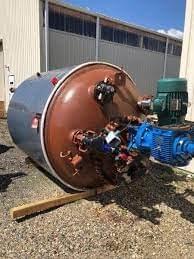
Reactors are used in various industrial processes to control the chemical reaction. They are made from a variety of materials, such as stainless steel and Hastelloy. They can be rated for a variety of operating temperatures and pressures. Manufacturer of standard and custom high temperature and pressure laboratory reactors. Types include batch and continuous stirred tank reactors. Serves the adhesives, agriculture, automotive, chemical, cosmetics, dairy, food and beverage, pharmaceutical, metallurgical, paper and pulp, and water industries.
Reactors are used in a variety of applications to control pH, temperature, foaming and reaction speed. They are available in many sizes and styles, from standard batch reactors to continuous reactors. A continuous reactor can handle higher pressures and faster heat transfer than a batch reactor. This allows it to process materials that would require hours in a batch reactor within minutes in a continuous reactor. Reactors are also used as line or load buy reactors. Line reactors are wired in series between two points in a power system to minimize inrush current and eliminate voltage spikes. Load reactors are installed at the output of a motor drive to reduce harmonic distortion. They also help prevent the inrush current from overheating the power factor correction capacitors or the motor drive. They also protect against overvoltage and reflected wave noise.
Chemical reactors are used to facilitate the chemical reactions that are necessary for industrial processes. They can also be used to enhance the efficiency of these processes by reducing the amount of energy and raw materials required for production. This allows businesses to reduce their overall operating costs and improve the quality of their products.
Reactors can be divided into two categories: batch and continuous. Batch reactors are more flexible than continuous reactors, as they can be used for a variety of reactions. They are typically smaller and less expensive than continuous reactors, making them a good choice for smaller-scale production. On the other hand, continuous reactors have the advantage of faster heat and mass transfer. This enables precise control of the reaction process and reduces the risk of reaction runaway. They can also achieve higher utilisation of the reactor, as they don’t require as much time to be heated and cooled as batch reactors. For unbeatable deals on chemical reactors, click here or navigate to our official website.
Industrial reactors are used by chemical, pharmaceutical, food, oil and gas industries to facilitate the creation of new compounds or to change the properties of existing ones. These machines are designed to control the reaction conditions of the materials within them, resulting in higher yields and better product quality. While the vast array of types and sizes of industrial reactors can be confusing, it is helpful to focus on key design features that determine their capabilities. For example, continuous reactors carry reactants as a continuous stream and withdraw products continuously as well, while batch reactors operate in a transient state with variable process variables that are time-dependent. Batch reactors are a great option for certain types of reactions, particularly those involving high viscosities or those that require slower reaction rates. However, the use of a batch process requires more manpower to load and unload the reactor as well as to prepare it for the next chemical reaction.
